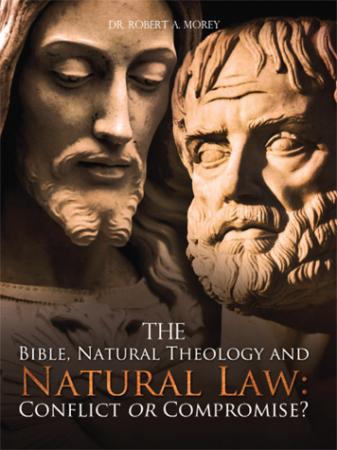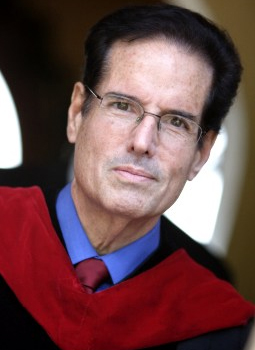Video Interview of Dr. Robert A. Morey on Natural Law in Las Vegas, NV in 2018 & Excerpt from book on the topic of Mars Hill

https://njiat.com/apologetics.html
For Audio Topic entitled Natural Theology--Is It Biblical? (Parts 1 thru 8) below (see the link Natural Theology: Is it Biblical? located at Natural Theology Audio Lecture
Natural Theology Study Outline--PDF; JBA (Vol. 1)--PDF; JBA (Vol. 2)--PDF; JBA (Vol. 9)--PDF; JBA (Vol. 10)--PDF. Video interviews also on Brighteon: Natural Law-Part 1 & Natural Law-Part 2
Video Interview with Dr. Robert A. Morey: "Natural Law--Part 1"
|
Video Interview with Dr. Robert A. Morey: "Natural Law--Part 2"
|

Dr. Bob's books including the book entitled The Bible, Natural Theology, And Natural Law: Conflict Or Compromise? can be purchased from XulonPress.com
(Dr. Morey names the colleges, seminaries, professors, etc. who sold out Biblical Christianity and the Reformation by teaching Natural Theology and Natural Law. Dr. Bob mentions in the video interview above that The Battle for the Bible written in the 1960s by Harold Lindsell (12/22/13 - 01/15/98, who was a founder of Fueller Thelogical Seminary) was the first person to document major Evangelical Schools in America that were abandoning the Bible and he named the colleges, seminaries and professors who were teaching heresy--he was severly criticized.)
See excerpt below on Mars Hill (Apostle Paul did not find common ground--Natural philosophers understood that they were being insulted by Paul’s revealed religion and “sneered” at Paul (v. 18)., Chapter 2, pages 66-67 (some words bolded for emphasis sake by NJIAT),
Chapter 2
The “heart” in Scripture is the seat of the intellect and not just a sloppy metaphor for feelings or emotion. Humanistic Christian apologists usually assume the Western philosophic dichotomy between “mind” and “heart.” They assume that “heart” is a metaphor for the emotions of man.
Natural theologians, true to form, never bother to pick up a Bible to see how the word “heart” was understood and used by the Biblical authors. They just assume that Plato or Kant or some other pagan philosopher was correct in the “heart versus mind” motif.
One way to ferret out humanists is to ask, “Is it possible to read the Bible in a devotional way with your heart as opposed to reading it in an intellectual way with your mind?” Humanists love to talk about reading the Bible in a “devotional” way, which means that they read the Bible with their mind in neutral gear. They can feel all warm and fuzzy about the Bible as long as they don’t have to exegete it. Since this issue touches on the subject of Biblical Anthropology, we will wait until we reach that section of the book to offer an exegetical answer to that issue.
God said, “I hate divorce” (Mal. 2:16). God is nowhere in Scripture said to create divorce. Fallen man created it. This is why Jesus is careful to say that Moses only allowed it because of the fallen nature of man. Jesus clearly uses Creation and Fall as the interpretive principles for marriage and divorce.
Witness #2
We now turn to the Book of Acts for our second witness. In Acts 17 Paul confronted the
Greek philosophers with three shocking ideas that had never crossed their minds:
a. Creation ex nihilo (v. 24-28),
b. The Fall of man into sin and guilt (v. 30),
c. Redemption through a resurrected Savior called Jesus (v. 18 cf. v. 31).
Paul pointed out that the “unknown God” - whom they admit they knew absolutely nothing about – happened to be the Creator of the Universe, the only God that actually existed!
I know this is going to be quite a shock to Natural theologians and philosophers. Plato, Aristotle and all other philosophers never found the true God through their reason (rationalism), experience (empiricism), feelings (mysticism), faith (fideism) or common sense, or intuition. Paul confronted the philosophers on Mars Hill with this truth and then explained it in detail to the Corinthians (1 Cor. 1:21).
the world through its philosophy did not know God!
![]()
The Greek syntax of the verse is emphatic for two reasons. First, the word ![]() (“not”) is taken out of its normal word order and placed first for emphasis sake. This means when you read the verse out loud, you emphasize the word “not.”
(“not”) is taken out of its normal word order and placed first for emphasis sake. This means when you read the verse out loud, you emphasize the word “not.”
the world through its philosophy did NOT know God!
Second, the verb ![]() is emphatic. The world utterly failed to know God. All the greatest philosophers and theologians never found the true God. All their philosophic wisdom ended with idolatry in which they “worshiped and served the creature rather than the Creator” (Rom. 1:25). A. T. Robertson comments,
is emphatic. The world utterly failed to know God. All the greatest philosophers and theologians never found the true God. All their philosophic wisdom ended with idolatry in which they “worshiped and served the creature rather than the Creator” (Rom. 1:25). A. T. Robertson comments,
Failed to know, second aorist (effective) active indicative of
γινωσκω [ginōskō], solemn dirge of doom on both Greek
philosophy and Jewish theology that failed to know God. Has
modern philosophy done better? There is today even a godless
theology (Humanism). “Now that God’s wisdom has reduced the self-wise world to ignorance” (Findlay).78
The Natural theologians and philosophers of Greece had erected great temples to the gods and goddesses created by human reason, experience, feelings, and faith. Yet, Paul dismisses these natural gods created by Natural theology and philosophy as depraved figments of vain speculations. The Greeks wasted their time and money erecting the temples on the Parthenon to worship the false gods and goddesses housed inside!
Some of the Natural philosophers understood that they were being insulted by Paul’s revealed religion and “sneered” at Paul (v. 18). They attacked him with such ad hominem slurs as “babbling idiot” (v. 18 cf. 32) and dismissed his message as irrational. Notice that Paul ignored the personal slander just as Jesus ignored it. My recent book, A Bible Handbook on Slander and Gossip, documents this point.
When Paul preached the Biblical concept of God to these Natural philosophers, he did so in two moves. First, he established the absolute sovereignty of God.
Seeing He is Lord of heaven and earth






































